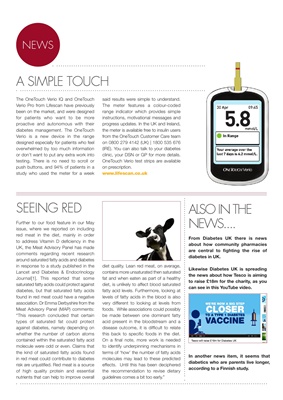
NEWS
A SIMPLE TOUCH
The OneTouch Verio IQ and OneTouch
Verio Pro from Lifescan have previously
been on the market, and were designed
for patients who want to be more
proactive and autonomous with their
diabetes management. The OneTouch
Verio is a new device in the range
designed especially for patients who feel
overwhelmed by too much information
or don't want to put any extra work into
testing. There is no need to scroll or
push buttons, and 94% of patients in a
study who used the meter for a week
said results were simple to understand.
The meter features a colour-coded
range indicator which provides simple
instructions, motivational messages and
progress updates. In the UK and Ireland,
the meter is available free to insulin users
from the OneTouch Customer Care team
on 0800 279 4142 (UK) | 1800 535 676
(IRE). You can also talk to your diabetes
clinic, your DSN or GP for more details.
OneTouch Verio test strips are available
on prescription.
www.lifescan.co.uk
SEEING RED
Further to our food feature in our May
issue, where we reported on including
red meat in the diet, mainly in order
to address Vitamin D deficiency in the
UK, the Meat Advisory Panel has made
comments regarding recent research
around saturated fatty acids and diabetes
in response to a study published in the
Lancet and Diabetes & Endocrinology
Journal[1]. This reported that some
saturated fatty acids could protect against
diabetes, but that saturated fatty acids
found in red meat could have a negative
association. Dr Emma Derbyshire from the
Meat Advisory Panel (MAP) comments:
"This research concluded that certain
types of saturated fat could protect
against diabetes, namely depending on
whether the number of carbon atoms
contained within the saturated fatty acid
molecule were odd or even. Claims that
the kind of saturated fatty acids found
in red meat could contribute to diabetes
risk are unjustified. Red meat is a source
of high quality protein and essential
nutrients that can help to improve overall
diet quality. Lean red meat, on average,
contains more unsaturated then saturated
fat and when eaten as part of a healthy
diet, is unlikely to affect blood saturated
fatty acid levels. Furthermore, looking at
levels of fatty acids in the blood is also
very different to looking at levels from
foods. While associations could possibly
be made between one dominant fatty
acid present in the bloodstream and a
disease outcome, it is difficult to relate
this back to specific foods in the diet.
On a final note, more work is needed
to identify underpinning mechanisms in
terms of 'how' the number of fatty acids
molecules may lead to these predicted
effects. Until this has been deciphered
the recommendation to revise dietary
guidelines comes a bit too early."
ALSO IN THE
NEWS....
From Diabetes UK there is news
about how community pharmacies
are central to fighting the rise of
diabetes in UK.
Likewise Diabetes UK is spreading
the news about how Tesco is aiming
to raise £18m for the charity, as you
can see in this YouTube video.
In another news item, it seems that
diabetics who are parents live longer,
according to a Finnish study.